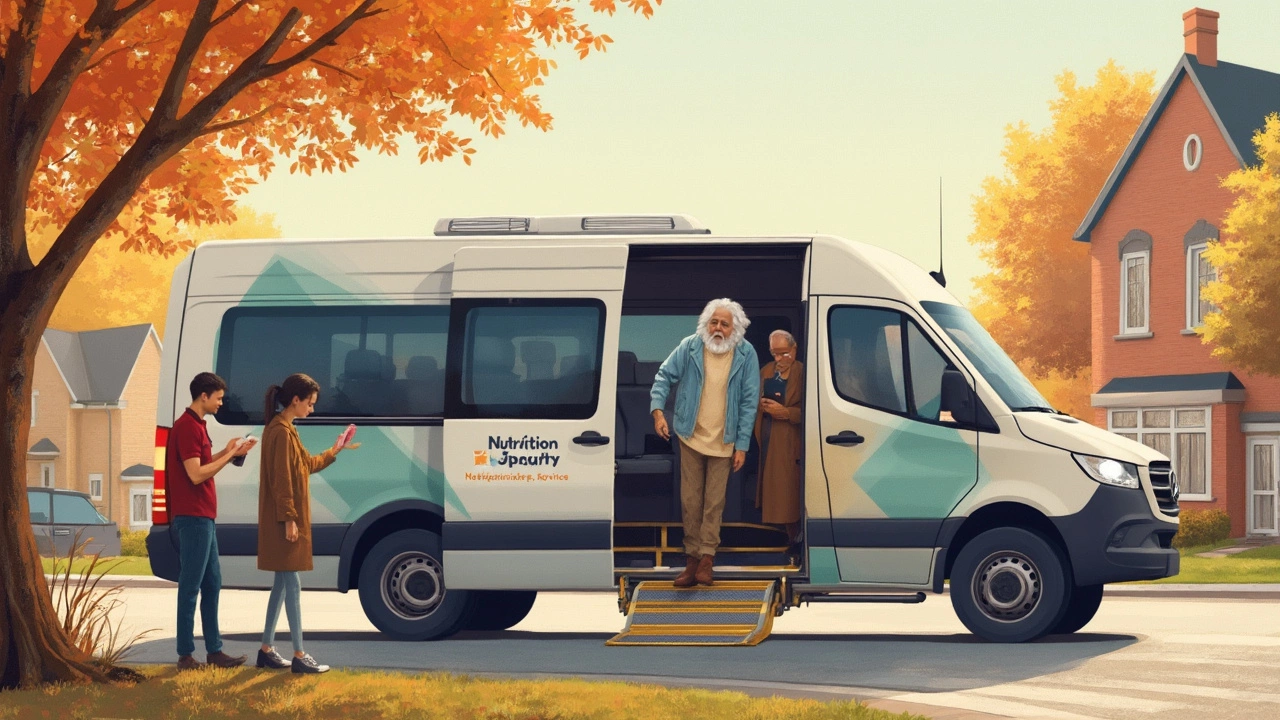Massachusetts Elderly Assistance Programs: Complete Guide for 2025
 Jun, 29 2025
Jun, 29 2025
You never really think about the minefield of aging until it’s right at your family’s doorstep. Suddenly, a parent can’t drive at night, or you notice the fridge looks emptier each month. Massachusetts has one of the oldest state populations in the country, yet most folks don’t know the safety net woven around seniors until they need it—or miss it entirely. Let’s pull back the curtain on the actual programs, loopholes to avoid, and a few clever tips to stretch resources even further. Whether you’re a caregiver juggling three schedules, or a senior trying to make sense of the forms piling up by the kettle, this guide just might turn stress into some real answers.
Understanding Elderly Assistance in Massachusetts
First things first—what counts as elderly assistance in Massachusetts, and who makes the rules? State and local governments, along with dozens of non-profits, offer a patchwork of support aiming to help people 60 and older live comfortably and safely. Some programs focus on keeping folks in their homes, others offer health-related help, financial aid, or just a way to feel less alone. But here’s a twist: eligibility can change depending on where you live, your income, and even how much help you need day to day. As of 2025, over 17% of Bay Staters are 65 or above. That’s more than a million people needing reliable support.
The backbone of senior support is the state’s network of Area Agencies on Aging (AAAs) and Aging Services Access Points (ASAPs). Every city and rural patch falls under an AAA or ASAP, serving different counties. Each one connects older adults to a bouquet of assistance, tailoring options depending on circumstances. They aren’t just anonymous agencies—they have real people on the line ready to talk you through what might work best, and they’ll often help with forms, appointments, or follow-up calls. Getting to know your local AAA or ASAP sooner rather than later is a lifesaver—literally.
For a bit of perspective, here’s a breakdown of key support areas, and the agencies moving them forward:
| Support Area | Main Provider | Common Eligibility |
|---|---|---|
| Home Care | ASAPs, AAAs | 60+, functional need, financial status |
| Nutrition Programs | Meals on Wheels, Councils on Aging | 60+, homebound or with nutrition risk |
| Transportation | Local COAs, SCM Elderbus | 60+, disabled, location |
| Medical Care | MassHealth, SHINE counselors | Income/asset limits for some programs |
| Legal Services | Legal Services for the Elderly | 60+, low income priority |
Tip: Start early. Some programs have waiting lists, especially for subsidized housing or certain home services. Applying months—or even a year—ahead can make a world of difference for choices later on.
Home Care, Health, and Daily Living Support
Keeping older adults in their own homes as long as possible is the gold standard, and Massachusetts invests heavily here. The state’s Home Care Program offers everything from simple meal prep and light cleaning to personal care like bathing help, medical reminders, and companionship visits. It’s all about what you need: partial or full care, temporary or ongoing. The application runs through your local ASAP, and an actual person assesses what type of help fits best, so there’s no cookie-cutter routine.
Services might include—depending on the plan you’re eligible for:
- Homemaking and housecleaning
- Personal care assistance
- Shopping and errands help
- In-home nursing and medical care coordination
- Adult day health programs for social time and supervision
- Companionship and specialized dementia support
What about costs? The Home Care Program slides based on income. Some pay nothing, some share costs, and those over certain thresholds can still get private care referrals. Medicaid (called MassHealth here) kicks in for those with low income and few assets, covering home services, skilled nursing, and even some adult day health programs. Special branches of MassHealth—like the Frail Elder Waiver or PACE (Program of All-Inclusive Care for the Elderly)—offer wraparound support with everything coordinated, from healthcare to meals to transportation.
Those on Medicare (almost all adults over 65) benefit from another ace: SHINE Program volunteers. These neigborhood experts cut through jargon on insurance plans, prescription drug programs, and out-of-pocket savings. They get busy—especially during the annual insurance open enrollment—so book early.
Quick tip: If you feel stuck on endless paperwork or confused by “function scores” and eligibility, ask for a case manager. ASAPs can assign one to advocate for you, answer questions, and flag deadlines before you miss them.
Food, Nutrition, and Meals Services
Food insecurity grows with age—mobility might dip, grocery budgets don’t stretch, and cooking can become daunting for those with health problems. Massachusetts answers with robust nutrition programs, mostly free or ultra-low-cost. Municipal Councils on Aging run “Congregate Meal” lunches at senior centers, churches, and public housing spaces. These are open to anyone 60 and up—no income checks, no paperwork. They double as a place to socialize, which health studies tie closely to better nutrition and happier aging.
Meals on Wheels, a household name across the U.S., delivers hot meals right to the homes of those who can’t shop or cook. In Massachusetts, ASAPs manage distribution with a sturdy network of volunteers and drivers. You get a balanced meal, wellness checks, and often a friendly face who notices if something seems wrong. Some programs run seven days a week, covering high-need areas.
Here’s something few realize: SNAP (Supplemental Nutrition Assistance Program, or “food stamps”) isn’t just for low-income families with kids. Massachusetts makes enrollment easier for seniors, with a simplified application and help from local agencies. Combining SNAP with COA food pantries, Meals on Wheels, or congregate meals can fill in any nutrition gaps. Bonus: Some farmers’ markets in Massachusetts accept SNAP and the Senior Farmers Market Nutrition Program. That means fresh produce—maybe even local honey or eggs—on a seriously tight budget. And don’t forget some pharmacies and markets loan grocery carts or offer free delivery for folks unable to leave home.
Tip: Many programs allow family or neighbors to pick up food for someone who can’t attend a meal site. A signed note is usually all that’s needed, so no one misses out.

Transportation, Mobility, and Getting Out and About
The biggest hurdle to independence for seniors might be mobility—not just physical, but logistical. Buses don’t always run when you need them, rideshares only go so far, and cabs add up quickly. Massachusetts cities and towns offer an overlooked gem: Council on Aging (COA) transportation vans, and regional paratransit like The Ride in Boston. These services help with rides to medical appointments, grocery runs, and even group outings to museums or lunch spots. Many are cheap (a couple of dollars per ride, usually) and door-to-door. If travel is a worry, getting your name in their system early reduces stress down the line.
Rural areas don’t get left out. Programs like SCM Elderbus provide scheduled pickups in Western and Central Massachusetts, with extended routes for specialty care. Most of these rides need some notice—usually one or two days ahead—so planning matters more than spontaneity. For wheelchair users or those with mobility tools, there’s usually extra help loading and unloading, and some vehicles have lifts or ramps. Drivers get special training to assist safely, so don’t hesitate to ask for a hand getting in or out.
And here’s a pro tip: The Massachusetts Senior CharlieCard drops local Boston transit fares to a fraction of normal. Apply with an ASAP or at select MBTA locations. If a medical issue or sight problem stops you from using regular public transport, paratransit options expand even further. Long-distance medical trips sometimes get covered by MassHealth, but you’ll need doctor confirmation in advance.
Housing, Legal, and Financial Assistance
Affordable, safe housing is a massive concern, especially with Massachusetts rental prices climbing each year. Seniors have a few tailored options: Subsidized public housing for those over 60, Section 8 vouchers, and nonprofit-run senior apartments that balance lower rents with supportive services. These waitlists can stretch a year or more in competitive areas, so applying as early as possible—sometimes years before it’s needed—makes sense. There are even some emergency grants for utilities or home repairs if something urgent crops up like a broken furnace in the dead of winter.
Legal help is another lifeline. Massachusetts has programs like the Legal Services for the Elderly, which provides free or sliding-scale advice on everything from eviction prevention to arranging a health proxy or living will. Scams against seniors spike every year, so these lawyers also run workshops to spot fraud and keep bank accounts safe.
Financial assistance goes far beyond pensions and Social Security. State-run “Circuit Breaker” tax credits refund some property taxes or rent, depending on age and income. Elderly individuals struggling to pay for heat or medical bills can apply for LIHEAP (fuel assistance) or prescription drug cost help. When in doubt, ask your AAA or local Council on Aging—they often know about smaller, local grants or relief funds that supplement state and federal options. Some even offer workshops on digital banking and budgeting for seniors worried about online scams or missing out on government payments. Stay alert for city-specific programs, especially in cities like Boston, Worcester, or Springfield—they frequently roll out extra support for seniors coping with high costs of living.
Getting the Most Out of Massachusetts Senior Services
Almost every elderly assistance program in Massachusetts is built around real, face-to-face connection—caseworkers, meal drivers, counselors, or bus drivers. If you don’t reach out, it’s all too easy to slip through the cracks. Don’t assume your needs are ‘not serious enough’ or you’ll be taking help from someone worse off; nearly every program is designed to meet people where they are, flexibly, and without making anyone feel like a burden. It might feel odd at first to call a number or show up for a group lunch, but the payback shows up in more meals on the table, freedom to get out, and peace of mind when you need it most.
Practical wisdom from those who’ve been there? Bring a folder for all paperwork—seriously, one for every agency. List questions before phone calls. Jot down the names of every person you speak with. And don’t be afraid to get a second opinion if something sounds off or a benefit gets denied. Councils on Aging and AAA hotlines aren’t just for emergencies; they’re real people who’ve seen every question and story under the sun. If you hit a roadblock, even something small, bring it up—sometimes there’s a solution no one has advertised.
The network of Massachusetts elderly assistance programs grows every year, with new pilot projects on housing, digital access, or mental health coming online. Staying in touch with your local Council on Aging or ASAP means you’ll hear about fresh programs as soon as they launch—not months later when spots run dry. Ask about newsletters or text alerts, and watch community notice boards for workshops or fairs meant just for seniors and families. That small act can make a huge difference when every bit of support counts.
